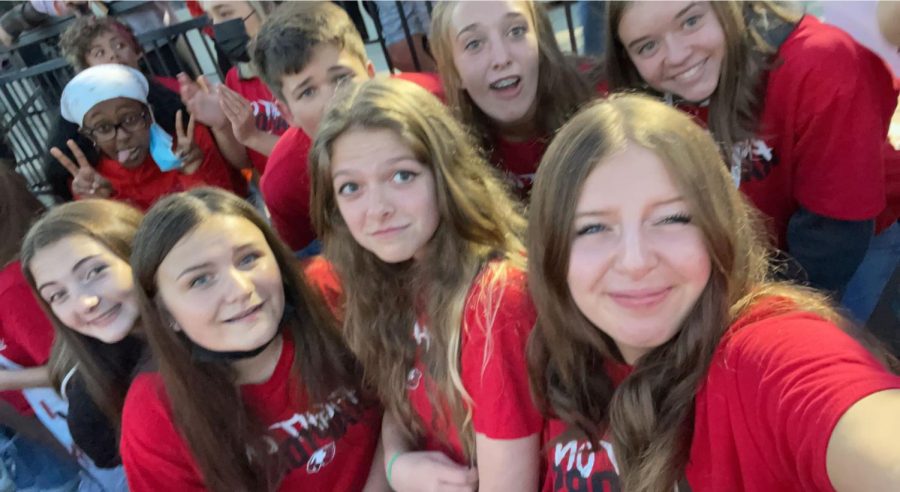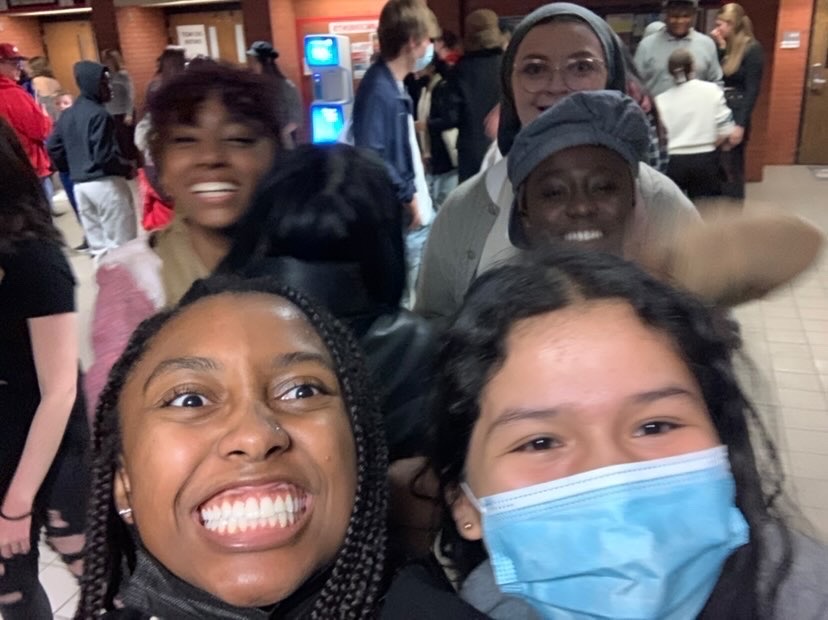How to High School
May 13, 2022
Photo obtained from Ryan Garza
Freshman at a football game first semester.
Dear Future Freshman,
Your tell-all guide in how [not] to be a freshman.
Being a freshman is far from an easy task. In a brand new school with little preparation, adjusting to a new and grueling schedule, and being teased by upperclassmen are just some of the things that freshmen have to deal with.
But the freshman experience can be made easier. There are certain things you have to do in order to maximize success here at Eaglecrest High School, and that’s especially true for the youngest class in the building. Here are some tips on how to be a good freshman.
Take responsibility
“There are three types of freshman: there’s immature freshmen, mature freshmen and annoying freshmen. Any freshman can be any one of those things or any combination of those three things,” sophomore Adam Dymond said. “You just need to take responsibility, grow up, and mature.”
One reason freshmen are under constant scrutiny from older classmates is that many just haven’t grown up. Granted, this year’s freshman class have had this amplified thanks to the coronavirus taking away normality during very developmental years. But Covid didn’t create the problem, it just made it worse. Every freshman class–before, during, and after the pandemic–has gone through the same to some extent.
Maturing is a vital task for any incoming freshman, but that isn’t a simple task. An easy way to achieve it is to take responsibility for your actions and prevent them from happening in the future.
Immaturity can manifest in different ways, anywhere from being annoying in class to not taking responsibility with your assignments. One way to take responsibility in an academic sense is to…
Don’t skip
Skipping class is quite the common occurrence in high school, but it comes with consequences, especially for freshmen.
“Later on, when you’re a senior, you’re going to have to redo the class you skipped as a freshman,” freshman Mohamed Sylla said, “and that’s going to ruin your high school experience.”
Redoing classes is far from ideal, which is why it’s important to keep your grades up even as a freshman. And even if you do pass, keep an eye on your letter grade; your freshman GPA (grade point average) has a huge impact on your overall GPA, and if college is on your horizon, poor freshman grades will come back to bite you come admissions time. But have no fear, if you ever need it, there’s an easy option for help.
Don’t be shy
“Teachers are nice, they’ll help you,” freshman Layla Ruiz said. “Just don’t be shy.” It’s easy to overthink and try to avoid asking for help, but overcoming shyness is an easy way to find success, and not just academically.
Meeting new people is essential to the freshman experience; with hundreds of students you’ve never met, freshman year is the perfect time to branch out. It will also help with the final and most important tip for freshmen…
Have fun
It isn’t easy to come into a brand new building with brand new expectations, and it’s very easy to be caught in the stress of high school. But it’s important to remember that the most important key to finding success in 9th grade is simply to find enjoyment in the moment.
“Being a freshman is fun,” freshman Mohamed Sylla said. “You’re kind of careless because you have three years left.”
There are plenty of things to worry about during freshman year, but there are just as many things to be excited about and to have fun with. High school comes with plenty of opportunities to be careless, have fun, and do the most important thing you can do: enjoy the moment.
Dear Rising Sophomores,
Everyone stresses about making sure the freshmen have adapted to this next chapter of their life. Juniors are the most stressed with all of their tests. And senior year gets all the questions about the future and all of the choices that decide said future. I skipped over sophomore year, and you probably did not even notice. Sophomore year is the least talked about section of your high school journey, but this is not a bad thing.
This is the year to enjoy high school. You just overcame the first year and all of the drama of middle school friend groups splitting up. You do not really have to think about college yet and, most of the time, you have no idea what you want to do with your life after high school. You are, nearly, carefree during your sophomore days, so embrace it. Do not be a timid freshman anymore. You should talk more — specifically to three different types of people.
Look around your desk in class. And make some school-friends. These are people you would never see outside of school, but they are some of your closest friends. They help you get through those lessons or even crack a joke to pass time. School-friends are not the most important people you will meet in highschool, but they are the most fun. Inside jokes, group therapy during transitions and gossiping will make the long days a lot more enjoyable. Sophomore year is when I truly started to appreciate these drama-and-energy-free friendships. You should too.
I remember sitting in AP Gov (shoutout to Ms. Vigil) and forming, what we thought at the time, the best inside joke ever created. The three people I sat by and I noticed a piece of gum stuck to the wall, and we named it Larry. In true Diary of a Wimpy Kid fashion, Larry-touch quickly enveloped our group. For months we would shy away from the person who had the touch, and often ran out of the room in fear of getting touched after class.
This group and I talked everyday for a whole year, and they helped make my sophomore year a fond memory. We have not really hung out of school, and we sparsely keep in touch. But without them, I may have found myself more bored. School-friends get you excited about class and, in turn, make you more motivated. This school year is the time to buckle-down and not lose focus, school-friends keep you on track.
Look to the front of your classroom. That person who seems like they are talking forever is, in fact, a valuable resource beyond their lessons. Talk to them. Move past your angsty-early-teenage-year-self and learn to appreciate your teachers. As every teacher ever would tell you, they did not choose to be a teacher for the money. A good teacher will brand their profession as raising the youth to be ready to be an adult. Find a teacher you connect with and talk to them.
Mr. Anderson was my algebra 2 teacher. Even with my phone sitting in a pocket behind his desk, his class was always fun. I dreaded missing a period because I would miss more than just a lesson. He always had a story to pull us into our material for the day. He made a pumpkin-tracker to track the growth of a pumpkin a student in our class was growing. He made math-oriented escape rooms. And he never failed to make us laugh.
After I moved on from his class, I learned that this man is truly remarkable. He graduated from Duke and left a very well paying job to become a teacher. He loves his job and students. Looking back at his class, I learned so much more than math from him. I learned concrete life skills that I would have missed if I just paid attention to algebra 2. Slow down and meet your teachers. They have so much more life experience, and most are willing to share.
Look around your home. If you are fortunate enough to have parents that are asking about your day, answer them — beyond the classic “it was fine.” If your little siblings are nagging you about going to the park… go to the park. It is pretty plain and simple: you are not going to live in your childhood home forever, so you might as well embrace it.
For those of you lucky few who have never moved homes or have never experienced any form of trauma, the next few years of your life may be bumpy. Get prepared. The rest of high school, or college, may not be smooth sailing, and that is okay. When the going gets tough, go to your family for support when there is no one else.
I made the error a few times. I went hide in my room all night after school when things were hard. In retrospect, I had plenty of people to turn to under my roof. I should have used that resource to help me learn and grow — instead of doing it solo. Sophomore year is plain and simple; do not make it more difficult by growing alone.
Dear Incoming Juniors
Funmi Olkadipo and Abigail Popp (’23) looking thrilled on spirit bus during the 2021 spirit bus.
Junior year might be one of the worst years of your schooling — or so they tell you. And in part, this may be true. Junior year should come with a warning label: “Beware: difficult classes, stressful testing, and college and career pressures will ensue.” For most of you, the year will not be easy, and you may encounter new worries, new pressures, new stressors that force you to adapt and mature. And that can be incredibly intimidating. Yet because of these new worries, new pressures, new stressors, junior year can also become a year of intense personal growth — which is not necessarily a bad thing (you will understand soon why underclassmen get a bad rap).
Learning who you are as a person, as a student and as an adolescent is crucial to junior year. This year is the best time to figure out for yourself what you truly want and where you want to go. I don’t mean plan out the next ten years of your life, though. In fact, the prospect of figuring out what you want to do with your life at a mere 16 or 17 years old is a tall order, and anxiety-inducing for many. And what you want right now will change in the next few years. Who and where you are at this moment in time will change. Even within the next year, you will grow and become someone new, and it is worth it to take the time to self-reflect on your values.
I urge you, as a soon-to-be graduate myself, to take the time during junior year to discover what truly matters to you. To focus on finding yourself and not let outside pressures determine your course in life. Because this year is the year when you begin to look beyond high school — whether to a career or to college — and begin the process of spreading your wings. I believe it is paramount that in order to decide on a direction that you will be fulfilled by, you must first know yourself and what it is you want.
Yes, junior year will be a test of strength and will. Yes, it will teach you grit, determination, and how to live with sleep deprivation. Yes, it may be a shock to your system, teaching you your limits. But all of that can be a powerful mechanism for growth, helping you to discover coping methods and figure out how to balance life’s demands with self-care. But all of that can also become overwhelming, and when it is, take a breath. Take a break. Take time for yourself to recharge and reflect, because it is not worth it to sacrifice your mental health for a “successful” junior year (trust me, I tried it and — spoiler alert! — it has no benefits whatsoever). Do not be afraid to push yourself, but also do not be afraid to rest when you need it because burnout is real and will drag you down. Maybe you will be one of the lucky few for whom junior year is a breeze, but for most, the year tends to be marked by more emotional, academic, personal and athletic stressors than previous years, so figuring out the best way for you individually to cope is incredibly helpful.
I have gone on and on about the doom and gloom of junior year and how to find direction within it, but I have another equally important piece of advice: HAVE FUN. This is your junior year! You are finally an upperclassman — or woman or being. You know more people, most of you can now drive and you likely have a lot more freedom than your freshmen selves. So enjoy it: go to games (or shows or plays or volunteering — whatever floats your boat), hang out with friends (responsibly, of course), and pursue your passions. As someone whose junior year was engulfed entirely by the pandemic, I truly wish I had had the opportunity to participate more in my school — even as a relatively intoverted person. The experiences you have during junior year (and senior year) will stick with you and mean more than any academic or even extracurricular accomplishments. So live it up (again, relatively responsibly — you still have a future to think about)!
Junior year might be one of the worst years of your life — or it might be one of your best. You will experience new pressures and new problems, meet new people and be put in new situations. It is a time of great growth, but it should also be a time of great fun. Junior year is a good time to “work hard, play hard” but, most importantly, you cannot forget to rest hard. Take care of yourselves and each other, and good luck!
Dear Incoming Seniors
First things first: senioritis is real, and do not underestimate it. Every time you think it is getting bad, it will, in fact, get worse. And although you have probably been told that senior year will be better than junior year, this is only half true. In part, senior year is better because now you are the oldest, the supposed seasoned veterans of the school. This year, you are more comfortable in the school, know more people, and get a couple extra days off just because you are a senior. These are all wonderful perks…but there is also a lot more new pressure as a senior.
Some make the probably smart decision to take a lighter classload, but for those who end up juggling multiple A.P.s, extracurriculars, and athletics, this year, quite frankly, may be even worse than junior year in that respect. So if you plan to not lighten your load, at the very least take classes that genuinely interest you. Because now, in addition to regular school, seniors have to deal with applying to college or careers as well as figuring out graduation requirements and plans — which can be fun as long as you don’t let it overwhelm you.
My advice for college applications? Do. Not. Wait. Sometimes school or extracurriculars seem all-consuming and important, but if you are going to college, that is your future and it takes precedence. Your teachers may not be happy or even understanding, but in my experience, it is worth it to devote more time to the college search and application process even at the expense of schoolwork. My second piece of advice: use your resources. Become best friends with your counselor, familiar with all the college prep sites, and don’t be afraid to ask college-graduated adults in your life about their experiences. One of the most common regrets I have heard from seniors is that we all felt woefully unprepared for the college process. So learn as much as you can and get things done sooner rather than later. And do not forget that colleges need you — not the other way around. So be picky, figure out what you want in a college, and go for it. High school is not the end of the road for you…so that B or C that may happen if you focus your attention on college apps over schoolwork will not kill you — I promise.
For those not planning to go to college, the same thing essentially applies. You are setting up your future beyond high school this year, so try not to put it off. Your future is valuable and important and deserves your time and energy. This is a time to discover, believe, and invest in yourself.
So yes, senior year inevitably brings with it some stress and anxiety. You’re preparing to leave the only life you’ve really ever known: the lower-ed school system. It’s exciting, nerve-wracking, frustrating, joyous — all the emotions. And all these emotions will hit you at different times — probably when you least expect it, in fact. Your year, especially second semester, will be a rollercoaster and you will have to figure out a way to ride it out and even embrace it.
This does not mean that senior year won’t be the best year of high school, however. This year, I highly encourage you to truly do what you enjoy. Go to games, theater performances, club events. Enjoy those night drives with friends, those long days spent commiserating over lack of motivation and even those final English projects that you may otherwise despise. And don’t skip the senior traditions. The sunrises, skip days, breakfast: they are worth your time and besides, they always serve as a good excuse to catch up with friends.
Senior year is a year of lasts, so make the most of it.



